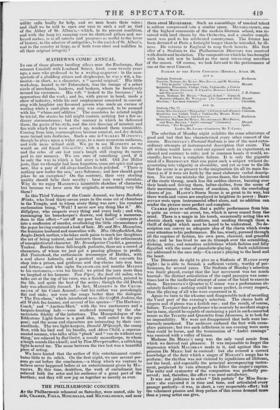THE PHILHARMONIC CONCERTS.
AT the Philharmonic rehearsal on Saturday, were seated, side by side, CRAMER, FIELD, MOSCHELES, and MENDELSSOHN, and near
them stood MEYERBEER. Such an assemblage of musical talent is seldom compressed into a similar space. MENDELSSOHN, one of the highest ornaments of the modern German school, was re- ceived with loud cheers by the Orchestra, and a similar compli- ment was paid to his celebrated countryman. The former has been detained at Paris a fortnight longer than he intended, by ill- ness. He returns to England to reap fresh laurels. His first offer of a Sinfonia to the Philharmonic Directors was received with doubt and hesitation. The compositions which he has brought with him will now be hailed as the most interesting novelties of the season. Of course, we look forward to the performance of. one at the next Concert.
SCHEME OF THE FIFTII CONCERT—MONDAY, APRIL 30.
ACT I.
Sinfonia Pastorale Beethoven. Terzetto, Madame DE Al zinc, Miss BRUCE. and M.IiJOREZ, " Pria di pair" (Idumezzeo) Mozart. Quintetto. Pianoforte, Violino, Viola, Violoncello, a Contra Basso. Messrs. CRAZIER, F. CRAZIER, MORALT, LINDLEY, and DuaueNxrrt J. B. Cramer.. Sceua, Madame DE MEMO, " Non piU di fiori." Corno iii Bmssetto obligato, Mr. WILLMAN. (La Clemenza di Tito) Mozart. Overture, " Les deux Jouruees" Cherubini.
ACT II.
Sinfonia (No. 7)
Haydn.
Scena,MissStIIRREFF,“ Deb parlate"(11Sacrijiziod'Abratno) Cintarosa.. Quartetto, two Viuliui, Viola e Violoncello, Messrs. MORI, GRIESBACII, MORAI.T, and LINIIT I Y Beethoven. Quartetto, Madame DE M id> SHIRREFF,Miss BRUCE, and Mons. BEOREZ, " AndrU rainingo" (Idomeneo) Mozart. Overture, " Der Bergvist " Spahr. Leader, Mr. LODER—Conductor, Mr. T. CoottE.
The selection of Monday night exhibits the same admixture of good and bad that has characterized every other concert of the season. BEETHOVEN'S Pastoral Sinfonia is one of the most extra- ordinary attempts at instrumental description that exists. The old writers would have cried out against such an experiment, as absurd and contrary to rule; and in common hands it would, as- suredly, have been a complete failure. It is only the gigantic mind of a BEETHOVEN that can paint such a subject without de- generating into vulgarity or absurdity, and yet so true to the life that the scene is as present to the imagination (in all its main fea- tures) as if it were set forth by the most elaborate verbal descrip- tion. No one can mistake the joyous dance, the boisterous shout of the rustic throng, much less the sudden shower, bursting over their heads and driving them, helter-skelter, from the scene of their merriment, or the return of sunshine, with the concluding chorus of joy. HADYN'S Storm Scene is as great in its way, but there words and voices are employed to heighten its power : BEET-- HOVEN rests upon instrumental effect alone, and no addition can. render the picture more perfect and complete. CRAMER plays so seldom, that a public performance from him is quite an event—an event, too, which is never erased from the-- mind. There is a magic in his touch, occasionally acting like an electric shock upon his auditors, and sending through them a_ thrillof delight which must be heard to be understood. No de- scription can convey an adequate idea of the charm which rivets your attention to his performance. He has, wisely, pursued through all the caprices of fashion, his own pure, classical, and graceful style; and he has lived to see its triumph over the scrambling,. dashing, noisy, and senseless exhibitions which fashion and folly dignified with the name of pianoforte-playing. Such exhibitions are addressed to the ears only—CRAMER's playing to the head and the heart.
The Directors do right to give us a Sinfonia of HAYDN every night: he is able to furnish a sufficient variety, worthy of per- formance, for several years. The Sinfonia of Monday's selection was finely played, except that the last movement was too much hurried : the distinct articulation of the rapid passages was some- times lost in the ineffectual attempt of some of the band to execute them. BEETHOVEN'S Quartet in C minor was a performance ab- solutely faultless : nothing could be more perfect, in every respect,. than the playing of all who were concerned in it.
Again we turn to the irksome and disagreeable task of recording the Vocal part of the evening's selection. The choice both of singers and of pieces was a foolish one ; and the result, of course, failure. To expect that a performer who scarcely by accident sings a bar in tune, should be capable of sustaining a part in such concerted music as the Terzetto and Quartetto from Idomeneo, is to look for an impossibility. We were not disappointed that both were bar- barously murdered. The audience endured the first with exem- plary patience; but two such inflictions in one evening were more than could be borne, and the termination of " Andr6 ramingo". was received with a volley of hisses.
Madame DE MERIC'S song was the only vocal music from which we derived real pleasure. It was impossible to forget the impression which MALIBRAN made in it, and against this im- pression DE MERIC had to contend : but she evinced a correct knowledge of the duty which a singer of MOZART'S songs has to perform ; the rhythm was not violated by injudicious ad libitums, nor the band, and especially the principal accompanying instru- ment, perplexed by vain attempts to follow the singer's caprice. The unity and symmetry of the composition was perfectly pre- served; and, therefore, the effect was most satisfactory. It was not judicious to select " Deh parlate " for Miss Snin- REFF : she executed it in time and tune, and articulated every
passage perfectly—it was, in short, a very respectable effort; but the vehement passion and deep pathos of this scena demand more than a young artist can give. •



























 Previous page
Previous page